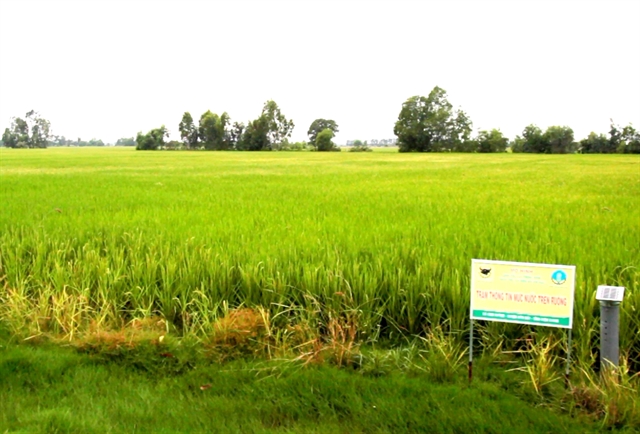 Society
Society

Authorities in the Cửu Long (Mekong) Delta are encouraging farmers to expand smart rice farming since it helps adapt to climate change, is environment-friendly and offers higher incomes.

|
| Rice grown using the ‘smart’ farming model in Kiên Giang Province’s Hòn Đất District. — VNA/VNS Photo Hồng Đạt |
HCM CITY — Authorities in the Cửu Long (Mekong) Delta are encouraging farmers to expand smart rice farming since it helps adapt to climate change, is environment-friendly and offers higher incomes.
It is dubbed ‘smart’ since it uses combined machines that transplant seedlings, fertiliser and spray pesticides at the same time and smart devices like mobile phones to manage irrigation.
It reduces the use of seeds, pesticides and fertilisers compared to traditional methods, but provides the same yields and quality.
In Cần Thơ City, farmers who adopted the model for the 2021 summer-autumn crop got an average yield of 7.5 tonnes and income of VNĐ27 million (US$1,900) per hectare, VNĐ3.4 million ($150) higher than from traditional models.
Mai Nam, deputy director of the city Agricultural Service Centre, said: “Farmers adopting the model are aware that its use of advanced techniques offers high efficiency.”
They reduced seed use to 60-80kg per hectare, and used the proper quantities and varieties of fertilisers at each stage, he said.
Trần Văn Nhãn, deputy director of the Đồng Tháp Province Agriculture Service and Clean Water Centre, said the use of the smart rice farming model in alum-tainted rice fields by the Tân Tiến Co-operative in Tam Nông District yielded good results.
The most significant change is the reduction in the volume of rice seeds used for sowing from more than 150kg per hectare in traditional farming methods to 60-80kg per hectare, he said.
Besides the economic efficiency it also helps reduce the adverse impacts on the environment, he said.
Farmers can reduce production costs significantly by using machinery for cultivation and reducing the use of seeds, fertilisers and pesticides, he said.
The delta, the country’s rice granary, has been facing extreme weather conditions and saltwater intrusion from the sea, and the model will help cope with them, according to local authorities.
The National Agriculture Extension Centre and Bình Điền Fertiliser Joint Stock Company started a smart rice farming programme in the delta in 2016.
It is being carried out in areas with alum soil or saltwater intrusion, and farmers grow two rice crops a year.
Doãn Văn Chiến, deputy director of the extension centre’s southern branch, said the techniques used in smart rice farming help reduce costs and improve yields and efficiency significantly.
The programme is expanding rapidly because of its efficiency and the southern branch would continue with the programme in the coming years, he said.
Many farmers adopting the model have also linked up with companies since the latter ensure outlets for their produce, instruct them in advanced farming techniques and secure inputs.
The techniques include alternate wet and dry irrigation to save water and the so-called ‘three increases – three reductions, one must – six reductions.’
Under the “one must – six reductions” method, farmers must use certified seeds and reduce the use of seedlings, nitrogenous fertilisers, plant protection chemicals, and irrigation, which results in a reduction in post-harvest losses and greenhouse gas emissions.
It helps reduce costs and is environment-friendly but still ensures higher yields than traditional methods.
The method provides rice plants with more space, and scientists believe this makes them stronger and yield more rice compared to traditional methods.
Trần Văn Út, a farmer in Vĩnh Long Province’s Vũng Liêm District who adopted the model for the 2021 summer – autumn crop, said the plants are robust, do not easily flatten in strong winds and are highly resistant to disease.
This helps reduce the use of fertilisers and pesticides, he said.
The recourse to alternate wet and dry irrigation helps reduce the use of water for irrigation.
Farmers in the delta have planted 1.52 million hectares of rice in the 2021- 22 winter-spring crop and local authorities have warned about a possible shortage of irrigation water at the end of the crop. — VNS




